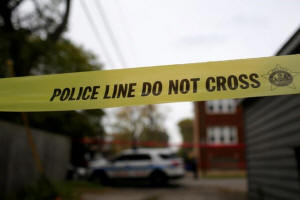|
Chicago homicides fall 16 percent in 2017
 Send a link to a friend
Send a link to a friend
 [January 02, 2018]
(Reuters) - Homicides in Chicago
fell 16 percent in 2017 while shootings were down and firearms arrests
were up, police said on Monday, marking a reduction in bloodshed that
made the city a symbol of U.S. gun violence and an object of criticism
for President Donald Trump. [January 02, 2018]
(Reuters) - Homicides in Chicago
fell 16 percent in 2017 while shootings were down and firearms arrests
were up, police said on Monday, marking a reduction in bloodshed that
made the city a symbol of U.S. gun violence and an object of criticism
for President Donald Trump.
Police reported 650 homicides in an annual report on crime statistics,
down from 771 in 2016. Shooting incidents fell 22 percent and the number
of shooting victims fell by 892 people, a 21 percent drop. Meanwhile,
gun arrests increased 27 percent and police reported seizing more than
8,600 illegal weapons.
Police attributed the drop to putting more officers on the streets,
investing in new technology and a smarter policing strategy.
The city was also coming off a high baseline after the number of
homicides in 2016, which represented a nearly 60 percent spike from the
previous year.

The United States' third largest city still ranks No. 1 in murders, with
more than the two largest cities combined. New York and Los Angles each
had fewer than 300 homicides in 2017.
Overall crime for other offenses - including sexual assault, robbery,
aggravated battery, burglary and vehicle theft - was down 2 percent,
police said.
"I am proud of the progress our officers made in reducing gun violence
all across the city in 2017, but none of us are satisfied," Chicago
Police Superintendent Eddie Johnson said in the report. "In 2018, we are
going to work to build on the progress we made last year - to reduce gun
violence, to save lives and to find justice for victims."
Chicago initiated police reforms in 2017 after a federal investigation
found officers routinely violated people's civil rights, citing
excessive force and racially discriminatory conduct.
The city hired more than 1,100 new police officers in 2017, and the
department issued a new policy on use of force.
Crime fell by 43 percent in Englewood district and 26 percent in
Harrison, the first two districts to employ so-called Strategic Decision
Support Centers, police said.
[to top of second column]
|

Yellow police tape is displayed at a crime scene after a motorist
was shot in the head along the 2700 block of south 80th Street in
Chicago, Illinois,
U.S., November 1, 2017. REUTERS/Joshua Lott/File Photo

The centers use predictive crime software to enable a more efficient
deployment of officers, install more cameras, set up gunshot
detection systems and send real-time notifications and intelligence
data to officers on their smartphones, the department said.
The deployment of more than 7,000 body cameras was the largest of
its kind in the United States, the report said.
Trump made Chicago crime a theme of his 2016 campaign and kept
criticizing the city in 2017 even as crime fell.
"Crime and killings in Chicago have reached such epidemic
proportions that I am sending in Federal help. 1714 shootings in
Chicago this year!" the Republican president wrote on Twitter in
June.
Attorney General Jeff Sessions said Trump's tweet referred to
sending more federal agents to Chicago and plans to prosecute
firearms cases aggressively.

A spokesman for Chicago Mayor Rahm Emanuel, a Democrat, thanked the
U.S. government for 20 additional agents from the Bureau of Alcohol,
Tobacco, Firearms and Explosives but said the progress was made
before those agents had arrived.
(Reporting by Daniel Trotta; Editing by Frank McGurty and Jonathan
Oatis)
[© 2018 Thomson Reuters. All rights
reserved.]
Copyright 2018 Reuters. All rights reserved. This material may not be published,
broadcast, rewritten or redistributed. |